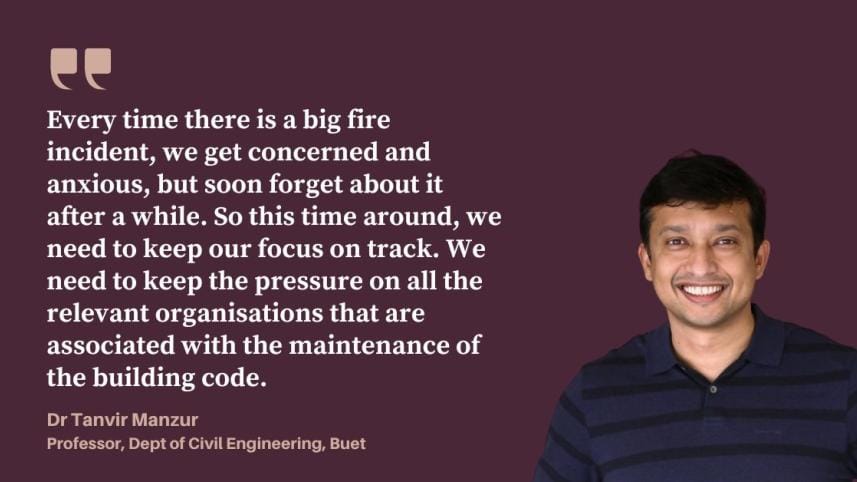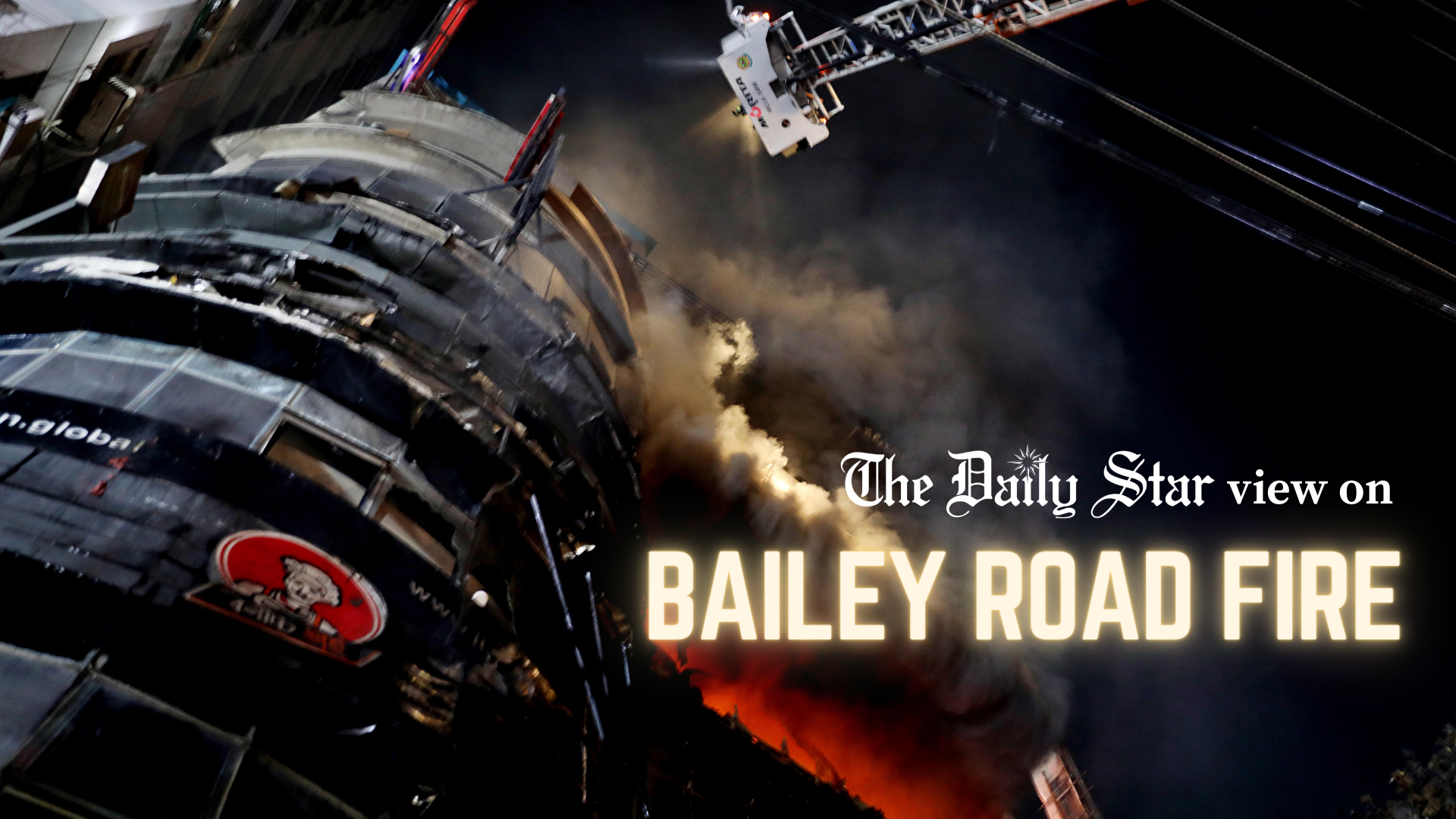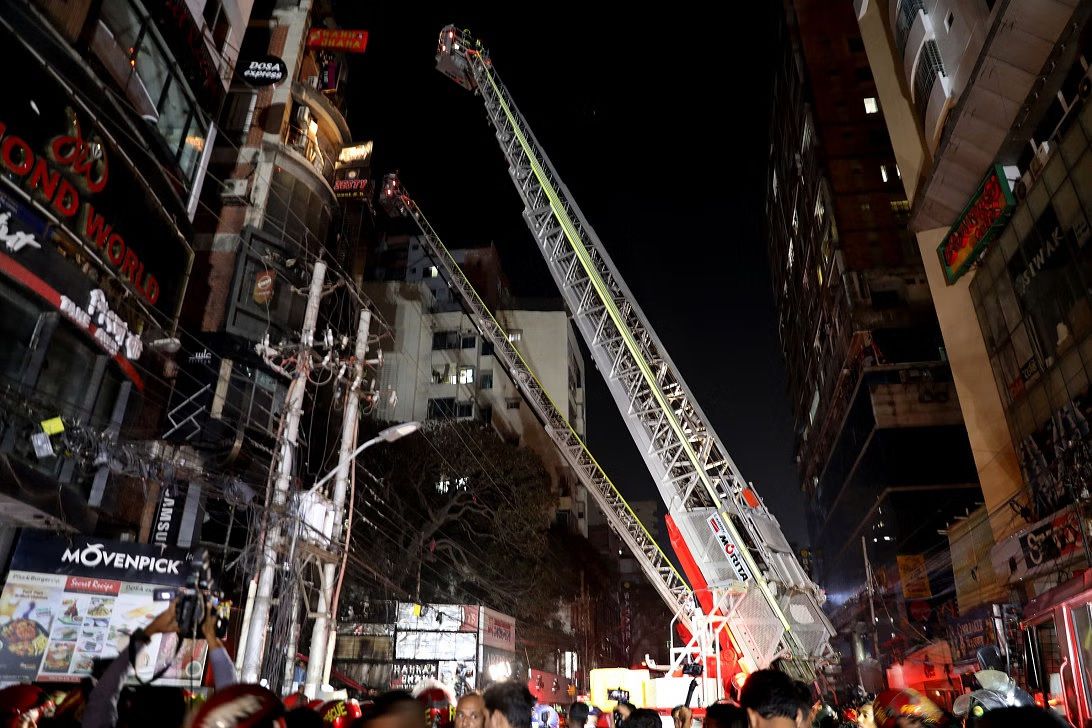'A fire-proof future depends on total enforcement of regulations'

Dr Tanvir Manzur, professor at the Department of Civil Engineering in Bangladesh University of Engineering and Technology (Buet), talks about recurring fire incidents and the lack of fire safety in buildings in Dhaka and elsewhere in the country, in an exclusive interview with Monorom Polok of The Daily Star.
Why do we often see fire incidents spiralling out of control?
A fire has a few stages: first comes the incipient phase, then the growing phase, then the burning phase. When we approach this from the fire science perspective, a person can control a fire at the incipient phase and the growing phase. Once it reaches the burning phase, ordinary people cannot put it out anymore. An automated system might be an option then.
We also see that these sorts of fires, while burning slowly, suddenly grow huge. This means once all of the "fuel" materials in the affected area—meaning the furniture, equipment, even ourselves; everything is fuel—reach their ignition temperatures (due to the heat), they will start burning. So once that flashover stage is reached, everything catches fire in the area and the fire starts spreading upwards. If we can get an indication of fire before this begins, it is possible to put it out. But past the flashover stage, it is quite difficult for even the fire service to put it out. As we see in the case of many big fires, the fire service struggles to put them out despite hours of effort. The fire goes out only when all of the fuels burn out. So any fire needs to be dealt with by the growing phase.
Some of my colleagues and I were watching a video of the recent Bailey Road fire. It seemed to have been growing for quite some time before people knew what was going on. Why? Because there wasn't any fire detection system. No alarms, no smoke detection machines. If there had been such a system, it could have detected the fire as soon as it started, and perhaps it could have been put out by someone.
How is a fire incident typically approached?
In any fire incident, there are three things to remember: first is protecting lives, then protecting properties, and then protecting the environment. Saving lives is the number one priority, before anything else.
We need a system that will prevent a fire from reaching the flashover stage. And even if it reaches that phase, it must be contained to a limited area, and all the people must be moved away from the affected building/area so that there are no casualties.
What went wrong in the Bailey Road fire?
In the Bailey Road incident, by the time people from the upper floors learnt about the fire, it was already in the flashover phase. Then there was the building itself. We have all been to buildings similar to the one that caught fire. It had a small lift and an adjacent small stairway. So smoke from the fire went up through all the openings available within the building. We need to remember that in a fire, most people die from inhaling carbon monoxide before burning. So by the time people realised the building was on fire, there probably wasn't any place to escape to that was smokeless. Also, there were no smoke detectors and fire alarms to alert people; by the time they became aware, it was too late.
Also, there were no fire exits in the building. And just fire exits themselves aren't enough either. They need to be enclosed. There is also a rating system to show how long they should be able to hold out: one hour, two hours, etc. There is also the occupant load to consider: how many people should be in the building. There is also a limit to the travel distance between a fire exit and the shops in these sorts of buildings. If the distance is too much, then there is supposed to be an additional fire exit. The doors also have to open to the outside as people start panicking in times of fire, and can't think clearly.

What can be done for buildings that have already been built without following the proper guidelines?
If we look at the Bangladesh National Building Code (BNBC), we will see that it is adequate and strict. There are performance-based directives as well.
In the case of an already constructed building that has not followed all the rules and guidelines, we can do back calculations. See what's the condition of the stairs. If it is possible to put in a fire exit. If not, then we have to calculate what is the maximum number of people that can occupy the building safely. Or perhaps we can consider adding sprinklers, which will give a bit of a buffer zone. But these decisions have to be made after making a case study of each building.
How come so many buildings have been built without properly following the building code? What can we change going forward?
This is probably the most critical question. Not following laws, knowing them but still breaking them, and greed altogether—are all major reasons behind the ignorance/neglect of the building code.
Going forward, I can think of three important steps. Firstly, there must be strict and blind execution of the building code. We need to follow the guidelines without cutting corners. Secondly, if we find that there may be necessary enhancements, we need to be conscious enough to add them in. Lastly, we need formal education. Our children don't get any training on how to deal with a fire incident. This should be incorporated into their education. We do offer some courses related to fire at Buet and are in the process of building an institute as well. Then it might be able to help in formalising fire education.
Gas cylinders are now being increasingly used in restaurants as well as in households. Does this increase the probability of fire incidents?
Using gas cylinders doesn't necessarily increase the chance that an accident will happen. However, certain precautions must be taken to store the cylinders. How many can you store in one place, and how to ensure the safety of that place? As the cylinders carry flammable substances, they will catch fire if there is a certain amount of heat around them. So some compartmentalisation may be required.
Nowadays, in residential areas, we see all the cylinders of one building being stacked up in one place. This increases the amount of combustible substance in one place. So guidelines on hazardous materials must be strictly enforced when storing gas cylinders. Without proper enforcement, safety codes mean nothing.
Do you have any suggestions for the general public regarding fire hazards and incidents?
Every time there is a big fire incident, we get concerned and anxious, but soon forget about it. So this time around, we need to keep our focus on track. We need to keep the pressure on all the relevant organisations that are associated with the maintenance of the building code. It has to be followed without exception. The media in particular should keep it on their agenda so that we don't lose sight of this very dangerous situation we are currently in.
Basic fire safety should be taught at schools as well, because today's kids will grow up to become owners of buildings and businesses and will run such establishments. So the importance of fire safety must be instilled in them from a young age. This would teach them what to do when there is an emergency as well as the importance of why certain steps must be taken so we don't end up in another crisis situation.
Enforcement, awareness, and formal education together can make a future possible where fire incidents don't cause preventable deaths.
Follow The Daily Star Opinion on Facebook for the latest opinions, commentaries and analyses by experts and professionals. To contribute your article or letter to The Daily Star Opinion, see our guidelines for submission.




 For all latest news, follow The Daily Star's Google News channel.
For all latest news, follow The Daily Star's Google News channel. 


Comments